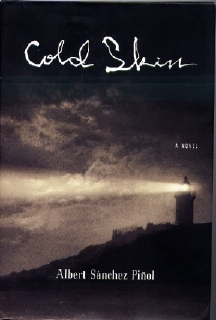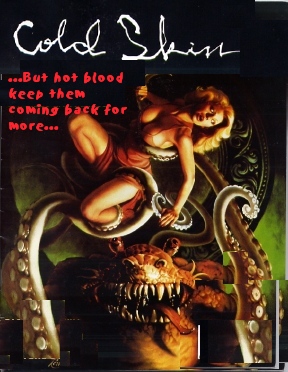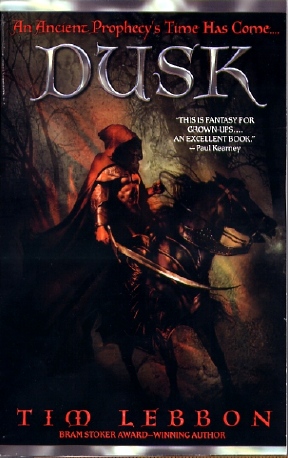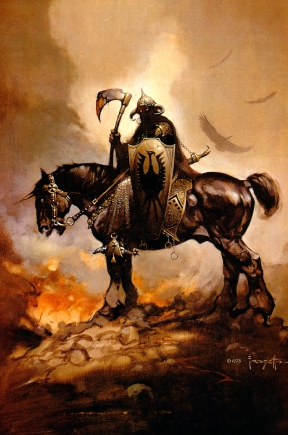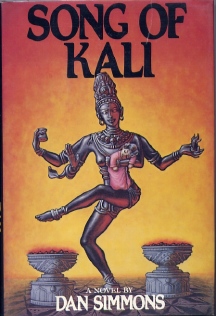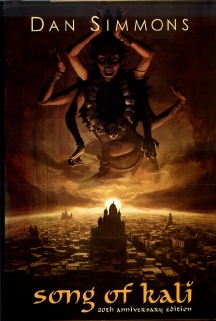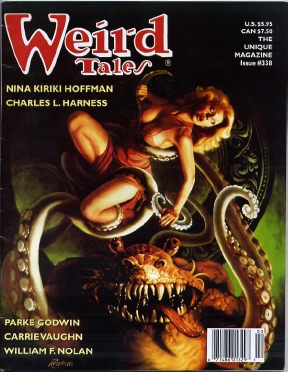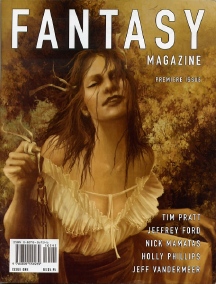|
|
|
This Just In...News from the Agony Column
|
01-20-06: Albert Sánchez Pinol Gets 'Cold Skin' |
||||||
But
Hot Blood Keeps Them Coming Back For MORE!
That said, it is totally easy to miss. It's slim, and the cover image is totally pertinent, perfect for the subject, yet totally uninformative. And as nice as the cover image is, well, it does seem a bit bland, considering. The DJ copy is also totally perfect, yet totally uninformative. So I'm going to reproduce it for you. "On the edge of the Antarctic Circle, in the years after World War I, a steamship approaches a desolate island far from all shipping lanes. On board is a young man on his way to assume the post of weather official. Here he plans to live in solitude for a year at the cold end of the earth. But onshore he finds no trace of the man who he has been sent to replace--only the lighthouse, a deserted cabin and the surrounding sea. And a mysterious castaway. Then night begins to fall... Albert Sanchez Pinol's Cold Skin is one of the strangest, most unsettling works of contemporary Spanish fiction, an internationally acclaimed tour de force of darkness and sexual anxiety." The back bit tells you he's an anthropologist who wrote a book on African dictatorships in the twentieth century. So you get a gander at the cover image, the verbiage and you think, what? Well, I'd probably think we had some sort of twisted romance, you know an exploration of sexual identity. Perhaps something well-written, but not exactly my stop. So, alas, you might not open up the book and read the astounding first paragraph. " We are never very far from those we hate. For this reason, we shall never be truly close to those we love. An appalling fact, I knew it well enough when I embarked. But some truths deserve our attention; others are best left alone." But as well-written as that may be, I'm still not necessarily up for a remote-island romance. But when I knew what follows on, well. That changes my take on this book, seriously. How so?
Now, as it happens, you could almost use that as a cover for this book, were you, say, a very cheesy horror publisher in the 1980's. I'll name no names, but you should be able to fill some in. The cover type I'd use then would say: "Cold Skin....but hot blood keeps the monsters coming back for more!" Now do I have my own attention? I guess so! Not only that, but I have the totally pleasant surprise of expecting something tawdry, something very cheesy, something with monsters, only to find a rather Kafka-esque, Lovercraftian literary masterpiece within. NOW do I have my attention? Look, I don’t care if it's a literary masterpiece, but you BETTER TELL ME THAT THERE ARE TENTACLED MONSTERS!!!!!! Thank you, I feel better now. Should you be standing in a bookstore, you'll have to read some 23 pages in to find your first monster. After that, you'll get the gist of what's going on here, which is that the "castaway" is a gun-toting maniac who spends his evenings taking out monsters. But these monsters, tentacles and all are apparently human enough to have... Other uses. And yes, what you have is shadows of 'Shadow Over Innsmouth,' which was always one of my favorite Lovecraft stories. Back-load that with the kind of talent that generates the opening paragraph above, and you have what presumably should be a contender for all sorts of Best-novel and Best-first-novel awards. Pinol's prose is tight, evocative and thought provoking. At 182 pages, 'Cold Skin' is barely more than a novella, really. Whatever it may be, don’t let it be missable. It's clearly the perfect Agony Column combination of actual monsters and literary technique. Plus it's short! Look, I understand if you don’t want to give away that there are monsters in this novel. I get that. But at least you could put one of the reviews that must have compared this to Lovecraft to give us an idea of the basic genre we're dealing with here. I suppose, well -- whatever. I've got it, you should get it (if this sort of thing sounds of interest to you and I well know it may not), and we're all the better for it. And it just occurred to me that once again, I'm being selfish. After all, if I'm annoyed that what looked like a desert island romance novel turned out to be a spam-in-a-cabin novel, imagine what those who were looking for literary, magic realism romance thought. I can see it so clearly in my mind, the look on some poor reader's face as the romance is subsumed by monsters. And I have to admit it makes me very, very happy to think it may have happened, even if it only happened once. |
|
01-19-06: Tim Lebbon Ushers in 'Dusk' |
||||||
Under
the Masque
Even if the work is as blandly packaged as 'Dusk'. Now, you might look at this on the bookshelves in the store and think it to be YAGCF* (Yet Another Generic Celtic Fantasy). Guys on horses with swords, maybe a touch of the Conan-esque in there as well. The kind of book that ensures that fantasy (so we're told) outsells science fiction by leaps and bounds. And while I say, "So we're told", actually, I did a bit of research recently and looked at some numbers from Nielsen's Bookscan, and alas, what they tell us appears to be true. A caveat does occur to me. If these are sales to bookstores, then naturally fantasy will outsell SF, simply because more books that fit under the fantasy genre banner than under the SF genre banner are being published. But to the outside world, it certainly all looks the same and it’s all pretty much shelved in the same ghetto. As one SF writer put it to me recently, "It beareth the Plastic Spock Ears stigma." And that's why I'm a bit saddened to see the Lebbon fantasy opus so blandly packaged. For all that fantasy blends together for the average consumer, there are works that get selected out of the pack. For example, George R. R. "Time Magazine" Martin. When his 'Song of Ice and Fire" series gets a nod in mainstream America's news as "the American Tolkien" or some such blurbworthy phrase, then even Ellison's Great Unwashed might take notice and put down the HC bestseller of the week and pick up the other HC bestseller of the week, that being Martin. After all, he was on the NYT list. But Martin's not the only worthy writer of men-on-horses fantasy. Steven Erickson and R. Scott Bakker are surely worth your time, and to my mind Tim Lebbon's fantasy debut is without doubt worth picking up. If you have to settle for the bargain basement look, then at least you have a bargain basement price.
With this place-visiting concept so significant to me, you can see why I anticipate Lebbon's first fully-created-from-whole-cloth world. Noreela has been in the works for so long, I'm willing to spring for this one and still hope that NightShade, which I believe was first slated to publish them, will eventually do so in some sort of ultra-deluxe (illustrated by JK Potter) edition. Now I understand that Lebbon would of course want to reach the biggest audience possible, and this trade paperback has all the advantages of the format. It's quite a bit easier to read than a mass-market paperback, yet significantly less costly (read:cheaper) than a hardcover. So look readers, here's the deal, I guess. (Sometimes I have to write my way to the solution, as it were, of a problem.) Sacrifices were made to get this utterly wonderful novel in the maximum number of hands. It is a finely crafted piece of fiction, even if it is cast in the guise of YAGCF. Don’t let that fool you. Like most very sharp things, it looks perfectly safe. But it will cut deeply, without remorse. |
|
01-18-06: Dan Simmons' 'Song of Kali' |
||||||
Twenty
Years On
I first read Dan Simmons' work in 1982 when he won a prize in a Twilight Zone Magazine contest for unpublished authors. At that particular time, I was living in sort of small house not far from Disneyland. I subscribed to TZ, and Simmons' work seemed striking, a great combination of science fiction and horror. "The River Styx Runs Upstream" clearly signaled the start of a career worth following. Dan Simmons' name stuck in my head. But it was not until 1985 when I first encountered 'Song of Kali'. I bought it at the Change of Hobbit bookstore when it was on Santa Monica Boulevard, and I remember feeling adventurous, and like a bit of a spendthrift. It was a sixteen dollar first hardcover novel by an author I'd read only once, in the aforementioned TZ. The publishing world was seriously different back then. This first edition was published by Bluejay Books, and attributed to "James Frenkel, Pubisher". But now, looking back I can see it was distributed by St. Martin's Press, a affiliate of Tor. Still, it was not exactly a genre publication. It sort of had the look but it didn't have the feel, not really. But at the time, I was not exactly a genre reader. Looking back, I was in between a lot of choices. I still enjoyed a lot of literary fiction as an outflow from my participation in the Writing Program at Irvine. I also liked some science fiction, but not much, mostly Stanislaw Lem and a writer he recommended in one of his essays, Philip K. Dick. The horror genre seemed pretty interesting to me, but it wasn't really as defined as it eventually grew to be. And 'Song of Kali' seemed to exist in-between all three poles, neither literary fiction, nor science fiction nor horror fiction. The mystery genre wasn't even on the map for me back then, though in retrospect, 'Song of Kali' has a place there. No, Simmons' first novel wasn't really anything I should buy according to my precepts of what was worthy of hardcover purchase. I'd buy an Arkham House H. P. Lovecraft novel, and eventually I bought the Scream/Press version of Clive Barker's 'Books of Blood'. 'Song of Kali' was an impulse buy, sort of, but the impulse was not just to spend, but rather the first indication that I might spend a bit of time and money reading. Really reading. And the novel itself delivered the best reading experience I could hope for, a surreal short sharp shock to my system that offered the feel of SF, of horror, without exactly succumbing to the conventions of any genre whatsoever. 'Song of Kali' is a no-man's-land of a novel that takes place in a no-man's-land. I was just in the throes of getting married and starting a family, and those who have read the book will understand the impact it had on me. It's an extremely harsh view of young western travelers, whatever their journey may be. Simmons' takes you straight into the darkness of India, but it's a darkness of the heart that is not easily set aside if you never travel. It waits for you wherever you go and however you choose (or are able to) to live. And talk about no-man's-land? 'Song of Kali' won a World Fantasy Award, which really threw me for a loop, since it didn't resembled the Tolkien-derived fantasies that dominated that genre at the time. It's in no way a fantasy. It doesn't even read in the least bit like a fantasy, not even a so-called "dark fantasy", the euphemism often uswed these days to decribe what we called "horror" Back In The Day.
Simmons' next novel was the monumental 'Carrion Comfort', published by a small press and illustrated by the author. But with first editions of 'Song of Kali going for anywhere from $55 bucks for an "ex-libris" (read: beat to shit and marred with a ripped out-library-card pocket) to $400 for a decent, signed copy, it was time to get a new hardcover edition out. So it is especially nice to have Earthling Books offer readers this beautifully bound hard hardcover edition of a genre classic. It includes only one page -- but a very nice page -- of sketches from the authors' original travels to India, and a new introduction. When you think of how costs have escalated in the intervening years, $75 for a signed, limited hardcover is clearly a bargain. Some twenty years ago, I made a choice to buy a book that was on the cusp of affordability to me, on the cusp of all my interests and none of my interests. It was a bit of an impulse, that reach towards darkness. And now, it's once again dark here in Aptos at 4:55 AM. My children are safely asleep and nearly grown. The books are utterly still and silent in the shelves. |
|
01-17-06: Weird Tales #338 and Fantasy #1 |
||||||
Lay
Flat, Scare the Getting-To-Know-One-Anothers Away
Weird Tales is sort of a perennial as well. Sort of. I subscribed somewhere back in the 1980's -- I think. Or at least I have a whole raft of issues in the slightly-larger-than-standard-digest size. And it was pretty damn great stuff too. But then both they and I dropped off of one another's radar. Readers will understand when they see this incredibly wonderful cover illustration why I found Weird Tales again. I mean, this is a picture that has it all. I bug-eyed, tentacled, slime dripping monster with fangs holding a scantily-clad busty blonde. This is how the world thinks of science fiction! And you know, I just don’t give a damn. Thank you Rowena Morrell (I'm guessing she's related to author David Morrell?) for making my day. This is just he kind of work to put a big silly grin on my face and move a magazine out of the rack and into my hands. Don’t know if it will do the same for Ma and Pa Kettle, but if not, that's their loss. Inside, readers will find the following. The magaine is 82 pages and includes stories by (in case you can't read the cover type) Nina Kiriki Hoffman, Charles L. Harness, Parke Godwin, Carries Vaughn and the second part of a longer piece by William F. Nolan. A nice mix of what we used to call mid-list authors, unknown-to-me and veterans. Each story gets at least one great illustration in B&W. Allen Koszowski, long a favorite, does a nice feature where he illustrates a classic short story not printed in the magazine, in this case a Ramsey Campbell classic. Scott Connors handles the very thorough reviewing chores, and there is even some verse. ("If life gives you bloodsucking freaks, just make blood-sucking freakade.") The paper is super-thin newsprint, but the printing and production make this an IDEAL lunch-read. It lies down nice and flat and the type is large and easy to read. The stories trend towards what you'd hope for in Weird Tales -- horror, fantasy, and science fiction that lean into the lurid. The advertisements may clue you in to a few titles you'd not otherwise find, something to consider when you buy this. You can subscribe in the US directly and interestingly enough, in the UK via Andy Richards' essential store, Cold Tonnage. Take another look at that cover image. Now, I mean, if you can resist that, then you probably should resist. If not, give in, and take that busty blonde and her pet monster to lunch. Make sure the other patrons see what you’re reading, and with luck, no loud-mouthed, early-stages-of-dating couple will sit near you to disturb your repast.
Taken together, we have another generation of potential greatness staring us in the face. Time will tell how well they hang on, how many stops and stutters and starts they make. But for the right here-and-now, I'd guess you've got one, maybe two weeks of literally fantastic lunch reading. Find them, buy them, read them, send more money to the publishers, and keep this gig going. They lie flat. Did I mention that they'll lay flat while you eat your lunch? And I guess that the chili verde will look nice as it is absorbed into the newsprint. Or is it Szechuan today? |
|
01-16-06: A Conversation with Tim Pratt |
|||
Keeping Santa Cruz Weird
Well, I'm doing my part. And Tim Pratt is doing his part. His novel. 'The Strange Adventures of Rangergirl', is a perfect little story of small-town supernatural doings and an excellent example of why you should always tip well when you go to the Café Pergolisi. I was fortunate enough to have Tim come down from his home in Oakland to talk to me about how he started his career in speculative fiction. He currently works for Locus magazine, which I will confess made me a bit nervous when it came time to talk to him. But it's hard to be nervous around someone who is so thoroughly enamored of the town where you live. (I actually don’t live in Santa Cruz, but a few miles south. Still, in California terms, I live in Santa Cruz.) And now that this gig is finally up on iTunes, I'm offering my first interview update to the podcast with this conversation with Tim Pratt. As usual, you can find it in MP3 and RealAudio formats if it isn't already on your player to listen as you drive about this fine day. Pratt told me his "I went west as a Young Man," story, and we talked about his peculiar brand of supernatural magic realism. I know readers will enjoy the conversation, though you might want to pick up his books before you listen, because afterwards you'll want to start them both immediately. And as to what's next -- oh my, monsters and plenty of them. And I'm sure they'll do their part in keeping Santa Cruz weird. If they get noticed, that is. |
